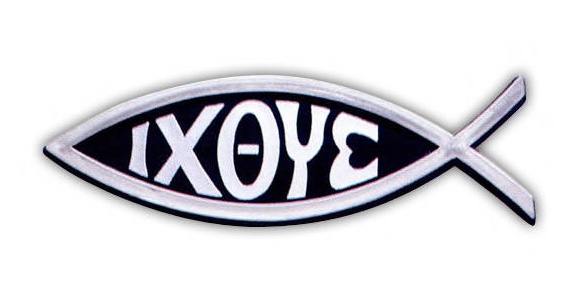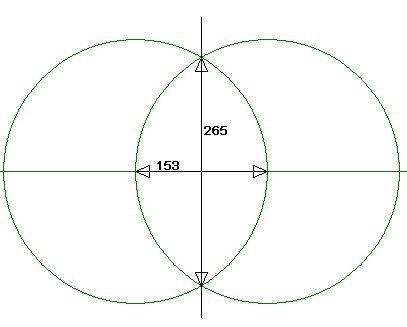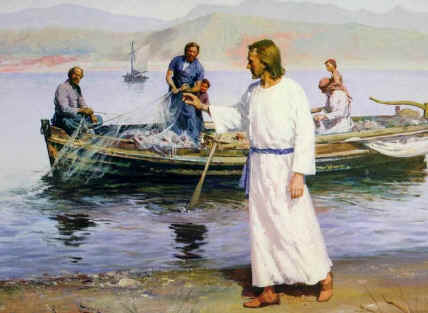Myth #77a: “But Jesus ate fish.”
It is indeed true that Jesus appears to support the eating of meat (mostly fish) at a number of points within the Bible’s texts, and there are two ways to go about responding to this claim – first, to gently illuminate the relevant Biblical verses; and second, to humbly assume that this myth is correct and then look at the practical, present-day implications thereof. First things first — a Biblical illumination:
*Passage #01 — Luke 22:7-8 does indeed have Jesus telling his disciples to prepare the Passover meal, and yet interestingly enough it never once has him telling them to obtain, cook or serve a Passover lamb therewith. Indeed, if we read the telling of the tale of the Last Supper, this lamb is completely missing from the story! In fact, there are no scripture passages in the entire Bible where Jesus himself actually ate lamb, which he would most assuredly have eaten at Passover — had he not been vegan. In fact, in the Bible we see Jesus eating on the Passover exactly twice, and curiously enough neither time is lamb involved at all; with Jesus and the disciples instead partaking only of unleavened bread at those celebrations.
*Passage #02 — Luke 24:41-43 does indeed show the disciples giving Jesus “a broiled fish and some honeycomb”, and yet then it also notes that “he took it and ate it in their presence” — not “them”, but “it”. Now, we can draw the conclusion that Jesus made the relatively compassionless choice to eat the fish and abandon the honeycomb, and yet according to a literal reading of the scripture he most certainly did not eat both of them. Indeed, we are also allowed to draw the opposite inference; namely, that he abandoned the fish and ate the comb. And it is this interpretation that is actually much more in alignment with Messianic “prophecy” of Isaiah 7:15, which states quite clearly that “By the time he knows enough to refuse evil and choose good, he [the Messiah] will eat only butter and honey.” (Granted, neither butter not honey are purely vegan foods, and neither one of them is meat, and the harvest of neither caused much suffering to animals in Jesus’ day & age.)
It might also be of interest to earnest students of scripture that this story is only told in the Gospel of Luke – and this, despite the authors of the other Gospels being present. It is also interesting that Luke tells the same story again in the 10th chapter of the book of Acts, and yet he tells it quite differently when he does so (not mentioning fish at all in the second telling) — and that when John describes the same event in John 20, Jesus is seen actually eating nothing at all.
*Passages #03 & #04 — Matthew 14:13-21 & Matthew 15:32-39 (see also parallel passages in Mark 6:30-44 & Mark 8:1-10) … These two texts both have Jesus telling his disciples to feed two large groups of followers (first “the 5000” and later “the 4000”) and both times fish are mentioned as one of the foods given to them (“two fish” in Matthew 14:17 & “a few fish” in Matthew 15:34). On its face, this would indeed seem to support the contention that Jesus approved the eating of meat, and yet there is much more to these verses than first meets the eye.
Initially, it is interesting to note that some scholars (Rosen and Knicely among them) contend that “fish” are not present in these texts at all – that in actuality the Greek word for “fishweed” (a form of dried seaweed) has been mistranslated as “fish” in these verses. While it is true that the ancient Greek words for seaweed (φῦκος / fukos + μνίον / mnion) are not specifically found in the Bible’s ancient manuscripts, it is just as true that such a mistranslation could very easily have occurred – and it is most certainly true that dried fishweed would be far more likely than fish to be served in a basket of bread. Indeed, a type of “fishweed” even remains a popular food to this day among coastal Palestinian peasants – people quite similar to the ones to whom Jesus was speaking in these stories. It is interesting to note as well that both Biblical feedings took place on the shoreline & that at least a few of Jesus’ disciples were fishermen by trade, meaning that if people had really wanted to eat fish, they simply would have had to go and catch some for themselves. Indeed, a careful reading of Matthew 14 shows that Jesus only divided the loaves of bread and only gave bread to the people gathered there – and that afterwards, the baskets were only filled with remnants of bread – not fish. Additionally, more than a few scholars have noted that there is quite a bit of evidence to suggest that the original story never included fish at all. The earliest pre-Gospel accounts of the feed-the-masses stories do not include fish, and Jesus himself never mentions fish when later referring to those events (see Matthew 16:5-12, Mark 8:19-20 & John 6:26) … Finally, it is well worth remembering that Jesus called his first disciples by asking them to cease fishing and follow him instead (see Matthew 3, Mark 1 & Luke 5); clearly resembling his later calls to tax collectors, prostitutes and others engaged in activities not in harmony with his message of Love & Compassion to “sin no more”.
As such, it seems much more likely than not that neither “fish” nor “fishweed” were present in the original telling of these tales, but rather that — just like the last 12 verses of the Gospel of Mark and the last chapter of the Gospel of John – scribes added words to the original texts for their own religious purposes (in this case, to insert the Greek word “fish” (ixous) – whose letters formed a then-popular acronym for “Jesus Christ God’s Son Savior”).
*Passages #05 & #06 – John 2:13-16 & Matthew 21:12-13 (see also Matthew parallels at Mark 11:15-17 & Luke 19:45-46) … While some critics claim that these passages represent a Biblical contradiction – with John’s “Temple cleansing” occurring near the beginning of Jesus’ ministry, and the nearly identical “cleansing” found in the Synoptic Gospels occurring some three years later near his ministry’s end – many scholars are of the different opinion that these passages show Jesus actually removing the soon-to-be-sacrificed animals & their human “masters” from the Temple on two separate occasions. More importantly, when we look more closely at these passages, a few interesting yet oft-overlooked facts are revealed …
First of all, it is intriguing that it was innocent animals that Jesus freed from the Temple (in effect a slaughterhouse in Jesus’ day) in the 2nd chapter of John – chasing them out with a self-made whip – echoing the powerful wisdom of Hosea 6:6-10 as he did so — “I desire mercy; not sacrifice” … Secondly, it is just as intriguing that the word “thieves” Jesus apparently uses to repudiate those in the Temple who are changing currencies &/or then selling animals for sacrifice is actually the Greek word “lestes” in the ancient manuscripts (Strong’s #3027) – a word that did not describe a mere “thief”, but rather indicated a brutally violent “marauder; one who exploits the vulnerable with violence”; a term that quite aptly describes every single slaughterhouse worker to this day. More support for this definition comes from two other instances in the Bible where the same term is found – first, Jesus’ not-so-subtle criticism of the violent group of heavily armed “thieves” who came to haul him off to his crucifixion (Luke 22:52 & Matthew 26:55) and second, to describe the two “thieves” who were later crucified with him on Golgotha (Mark 15:27 & Matthew 27:44 — remembering that crucifixion was a particularly painful form of execution that the Romans reserved for political insurgents & violent criminals)
*Passage #07 – John 21:5-14 … Admittedly, this particular passage – more so than the pervious six — does indeed seem to have Jesus openly supporting the eating of fish, and yet proponents of this opinion should also consider the following: first, please note that most scholars are in agreement that the entire 21st chapter of John was added to that Gospel many years after it was originally penned, and secondly, please note that nowhere in this passage does it say that Jesus himself ate the fish he apparently offered to his disciples. Finally, that the disciples caught exactly 153 fish here is quite suspect, considering the fact the numbers in most if not all Biblical texts were placed purposefully therein by their authors, and yet the significance of catching exactly this many fish is a topic of much depth* best reserved for another day.
*153 was a sacred number in Pythagorean communities, a number with special significance. The fish, and the number, are references to a mathematical principle often used in sacred-mystery texts called Vesica Piscis, or the “measure of the fish”, a form which occurs when two equal circles are joined so that the perimeter of one passes the epicenter of the other, producing a third, intermediate section which resembles the shape of a fish. The mathematical ratio of this section’s width to its length is 265:153, which yields the number 1.73203 — or exactly the square root of 3. This symbol was used in ancient mystery schools to represent the unification of divine principles. Indeed, three was a number of very special spiritual significance to the Jews of Jesus’ day.
And finally, second things second – in all fairness, what if the believers of this myth are actually correct? What if Jesus did indeed encourage the eating of fish &/or did eat fish himself?
Well, I guess we can start by noting the obvious – that if Jesus truly was a pescatarian (i.e. a vegetarian who also ate fish), then we can know thereby that he was clearly not yet aware of the needlessness of that act, much less the immense suffering that fish endure when they are killed & eaten by humans. Please understand that this factual revelation doesn’t make Jesus “unholy” or even “a sinner”, merely – like so many pescatarians today – very poorly informed. Indeed, it is quite easy see the Truth that imprisoning & murdering any sentient life form is in no way in harmony with Jesus’ professed standard of perfection when it comes to Loving & Respecting all life forms – “even the sparrows” (Matthew 10:29). Indeed, it is patently hypocritical to preach Love unconditional while consuming any sentient creature – and Jesus was most certainly not a fan of hypocrisy (see Matthew 3:8 + Matthew 7:15 + Matthew 15:8-8 + Matthew 23 et al).
Well, maybe he was a fish-eating hypocrite and maybe he wasn’t – maybe he was a courageous reformer of Judaism – and maybe he wasn’t as well … Personally, I choose to see Jesus as a man who was both well-informed and fully compassionate; a choice which undeniably would have made him at the very least a (still partially ignorant) honey & butter-eating vegetarian. And this view is indeed not at all farfetched, as the vegetarian sects of Judaism in Jesus’ day did in fact preach baptism for forgiveness of sins in place of animal sacrifice.
In conclusion, while no Biblical argument can ever hope to be fully irrefutable, the evidence in the Bible that Jesus was at least a vegetarian is quite strong, and the knowledge that he would most certainly be a vegan today is rock-solid. After all, would a man who fully comprehended and openly preached a Love that is perfect and without condition ever engage in, encourage or even mildly condone the needless suffering that animals endure while being confined before slaughter, on their way to slaughter or during the brutal killing act act itself? Of course he wouldn’t! And for a Christian to say anything less is to do nothing less than thickly taint the image of their own Lord & Savior …
In essence, Christians would do well to stop using the Bible to justify their own petty, selfish and cruel meat-eating & dairy-consuming habits, and start choosing to seeing Jesus as a truly perfect example of the perfect Love and the selfless Compassion and the gentle Justice that we all can become.
Amen … Let it be so.
Current status of this Myth: Lustrated
Justification it provides for eating animals: NONE








 ;
;